Roofing Companies Stevenston
Top 10 Roofers in Stevenston
Get multiple Roofing Service quotes for your project today! Compare profiles, reviews, accreditations, portfolio, etc... and choose the best offer.

The Skyline Group
4.130 reviewsGlasgow, GBAt The Skyline Group, we offer a full range of home renovations. Whether you want to update the aesthetic of your property, create more space or improve energy efficiency, we can help. Our fully qualified in-house tradesmen only use quality products to ensure the best finish for you. If you’re looking to make changes to your home, no matter how large or small, contact The Skyline Group today. Our team of experienced in-house professionals improve the homes of Glasgow and the Central Belt. Whether you want stylish new windows to welcome you home, or a garage conversion to maximise space, trust The Skyline Group to provide a comprehensive, quality service – whatever the job! In recent years, the company has grown from strength to strength, establishing ourselves as a leading contractor and providing our specialist products and services to both residential and commercial clients.
- Services
- Why Us?
- Gallery
Get Quote
W Milligan Roofing Ltd
54 reviews5 Craiglea Avenue, Kilmarnock, KA2 0JD, GBWe've been providing top quality roofing services throughout Ayrshire for over 25 years. W Milligan Roofing Ltd specialises in catering to all the roofing needs of clients in Glasgow, Kilmarnock and across Ayrshire. From fixing a small leak to a complete re-roofing, we can handle all your roofing needs. We only use superior quality materials for all the roofing projects we undertake. We also offer cladding, fascias, soffits and guttering. Our team of roofers go the extra mile to deliver quality services. At W Milligan Roofing Ltd, we have a team of dedicated and experienced roofers who have the expertise to undertake roofing projects of any size. We cover all aspects of roofing, from slate roofing to roof repairs.
- Services
- Why Us?
- Accreditations
- Gallery
Get Quote
Roofers Kilmarnock
54 reviews58 Blair Avenue, Kilmarnock, KA1 5BE, GBRoofers Kilmarnock is a local roofing company based in Kilmarnock, Ayrshire, led by Joe, who has years of experience handling various roofing issues in the area. They serve both residential and commercial clients, including larger industrial warehouses. The company prioritizes providing fair and honest roofing repairs and installations, including emergency roof repairs, understanding the stress a leaking roof can cause. They offer a wide range of services, from repairs and installations to cleaning and maintenance, ensuring they can meet diverse customer needs. Roofers Kilmarnock emphasizes a flexible approach, working with clients who already have materials or need supply and fit services. They are committed to providing high-quality services and maintaining their reputation for honesty and hard work.
- Services
- Why Us?
- Gallery
Get Quote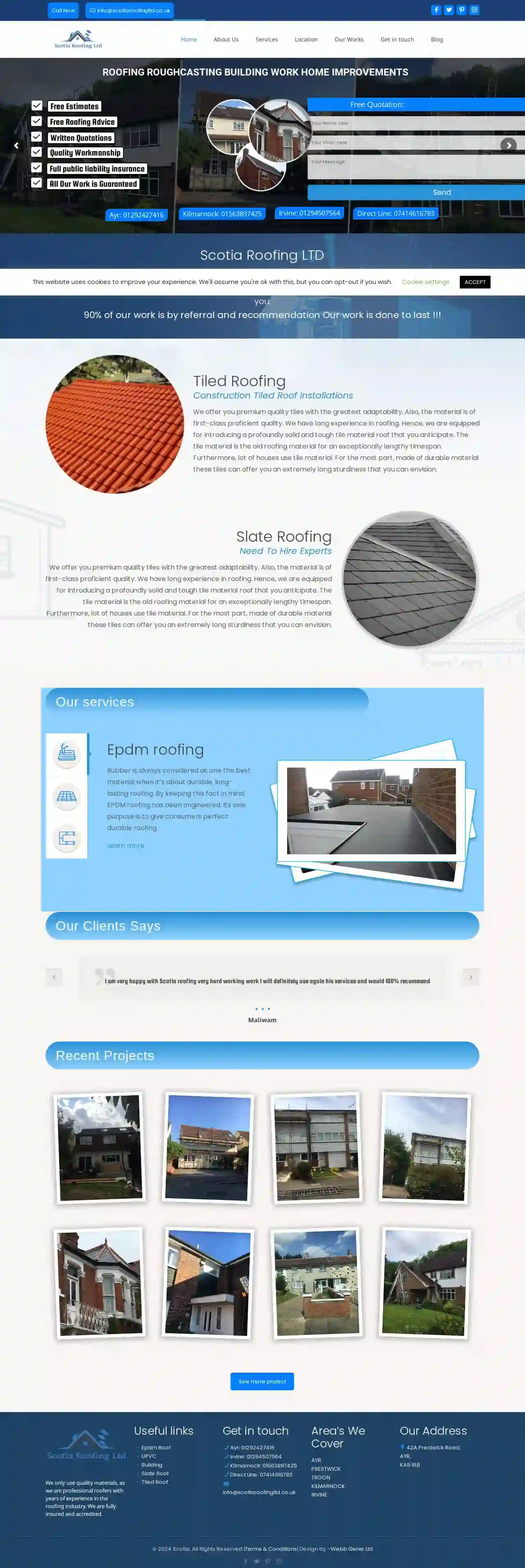
Scotia Roofing Ltd
51 reviews42A Prestwick Road, Ayr, KA8 8LB, GBScotia Roofing LTD is a roofing company based in Ayr, Scotland. They specialize in a variety of roofing services, including tiled roofing, slate roofing, EPDM roofing, and UPVC roofing. They also offer building works, exterior wall coating, sand stone restoration, and rough casting. Scotia Roofing LTD prides itself on using quality materials and having years of experience in the roofing industry. They are fully insured and accredited. The company serves a number of areas including Ayr, Prestwick, Troon, Kilmarnock and Irvine.
- Services
- Why Us?
- Accreditations
- Our Team
- Testimonials
- Gallery
Get Quote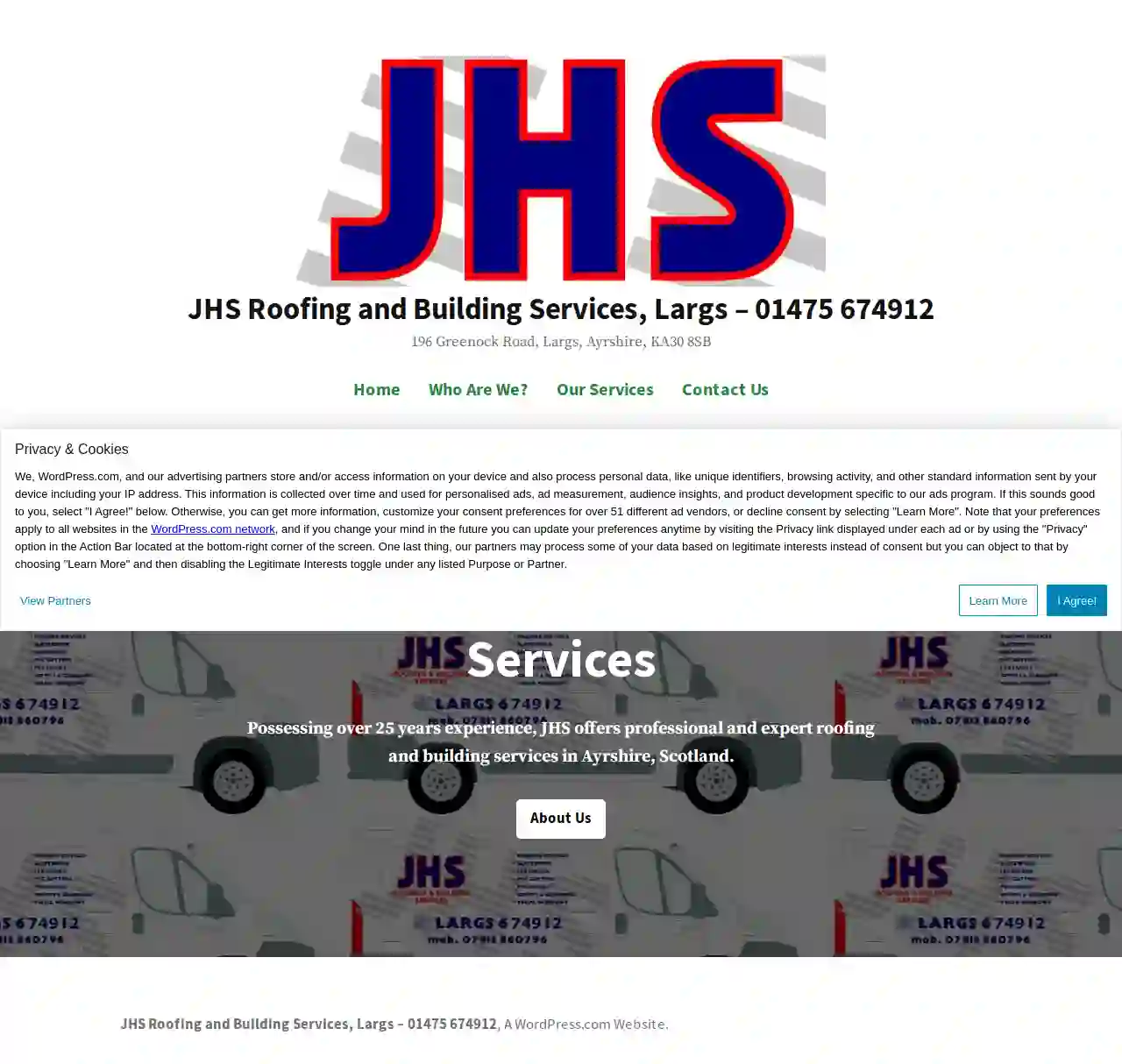
JHS Roofing and Building Services
52 reviews196 Greenock Road, Largs, KA30 8SB, GBJHS Roofing and Building Services, based in Largs, Ayrshire, Scotland, boasts over 25 years of experience in providing professional and expert roofing and building services throughout Ayrshire.
- Services
- Why Us?
- Gallery
Get Quote
RD Youngs Roofing Ltd.
526 reviews14 Carlisle Ct, Larkhall, ML9 2FD, GBR.D Young's LTD. is an experienced and professional roofing & guttering contractor based in Lanarkshire & Glasgow. We have years of experience in the construction & maintenance of roofing. If you require more information please don't hesitate to call or fill in the form below.
- Services
- Why Us?
- Gallery
Get Quote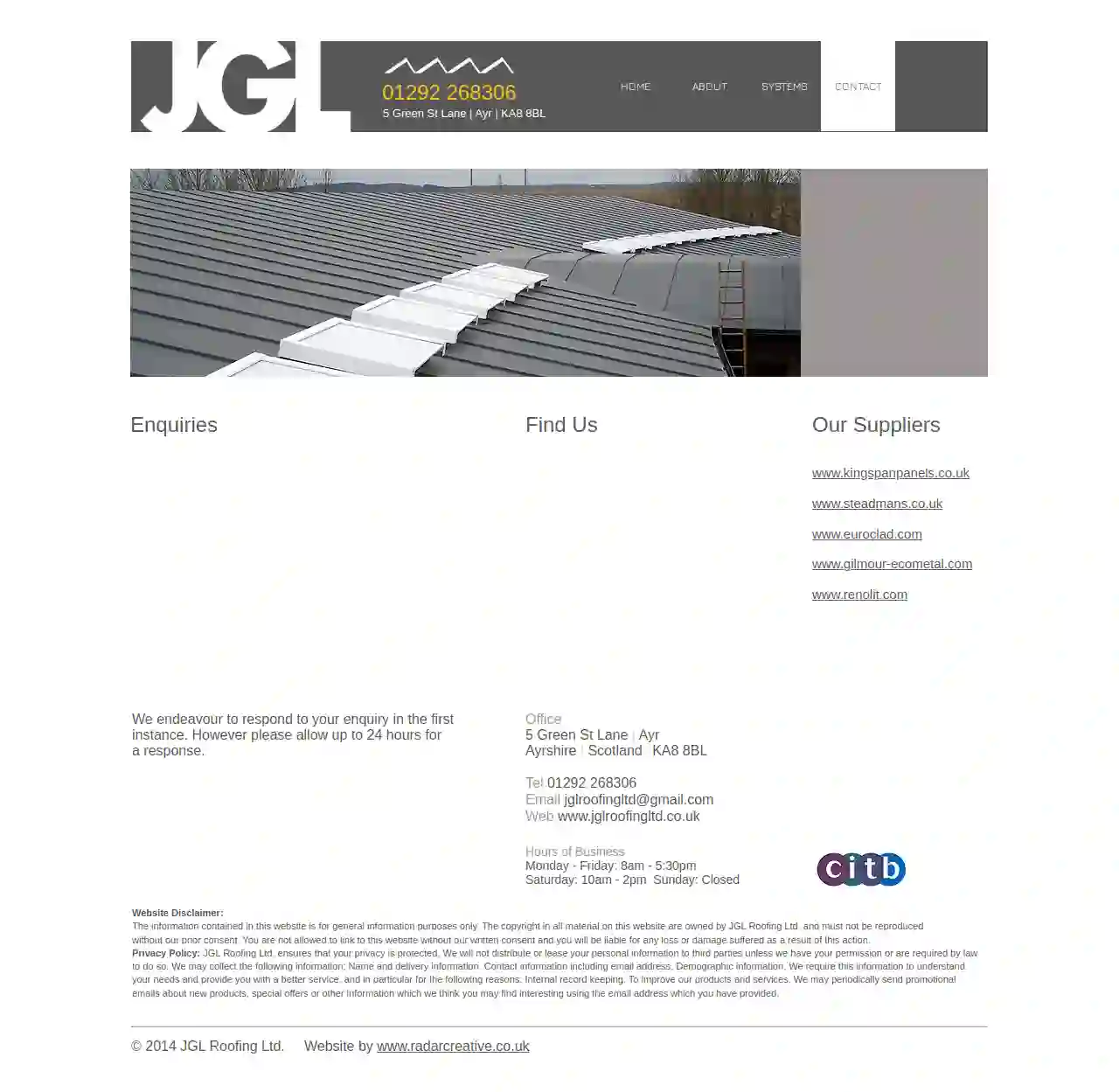
J G L Roofing Ltd
41 reviews5 Green St Lane, Ayr, KA8 8BL, GBJGL Roofing Ltd. is a reputable roofing company based in Ayr, Scotland. With a commitment to quality workmanship and customer satisfaction, we provide a comprehensive range of roofing services for both domestic and commercial clients. Our team of experienced roofers is highly skilled in all aspects of roofing, from repairs and maintenance to new installations. We use only the highest quality materials and employ the latest techniques to ensure long-lasting and durable results. At JGL Roofing Ltd., we understand the importance of a reliable and weatherproof roof. That's why we take pride in delivering exceptional service and exceeding our clients' expectations. Whether you need a minor repair or a complete roof replacement, our team is here to help. We are proud to be associated with leading roofing suppliers such as Kingspan Panels, Steadmans, Euroclad, Gilmour Ecometal, and Renolit. This ensures that we can offer our clients the best possible products and solutions for their roofing needs. Contact us today for a free quote and let us take care of all your roofing requirements.
- Services
- Why Us?
- Gallery
Get Quote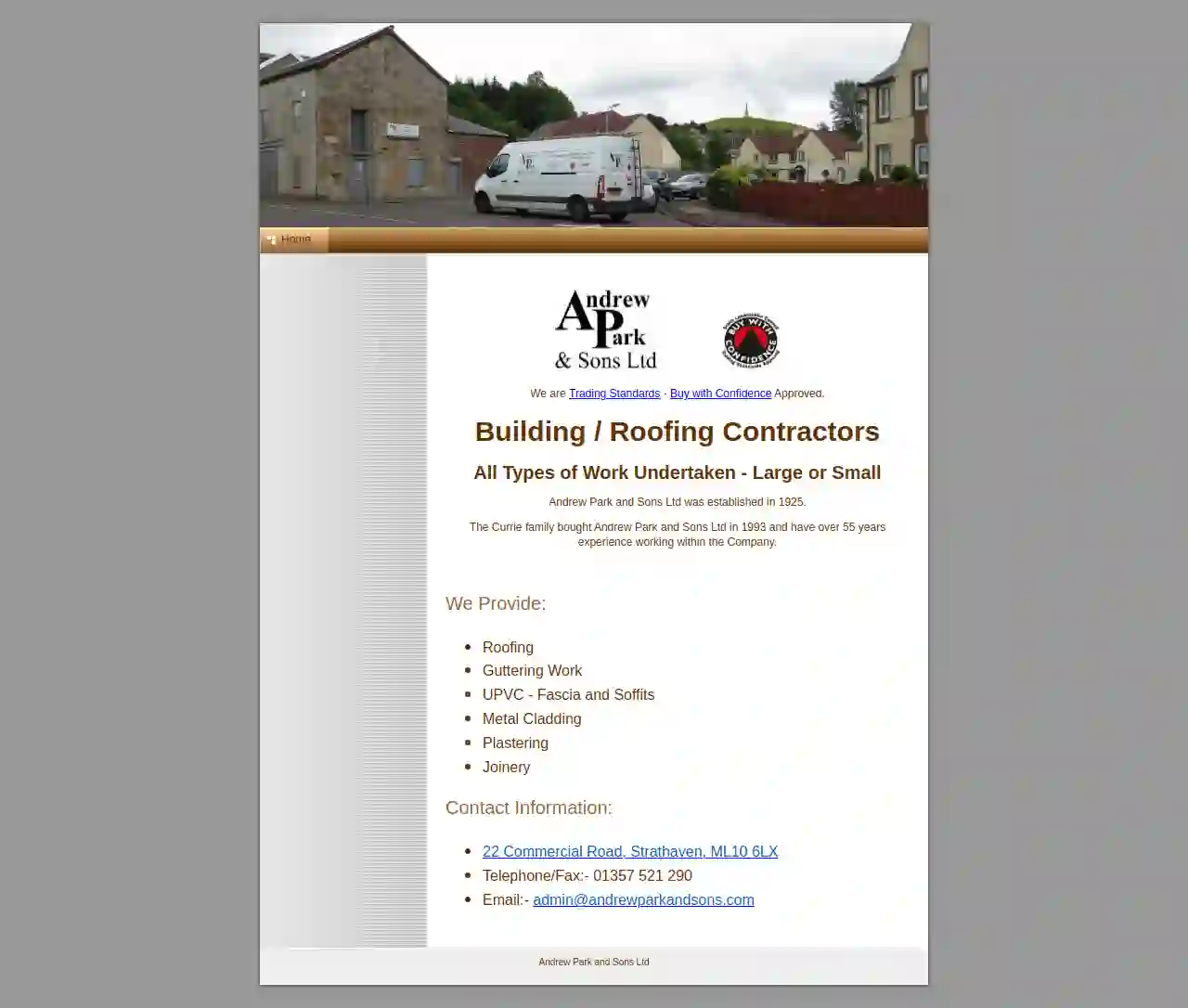
Andrew Park & Sons Ltd
52 reviews22 Commercial Road, Strathaven, ML10 6LX, GBAndrew Park and Sons Ltd was established in 1925. The Currie family bought Andrew Park and Sons Ltd in 1993 and have over 55 years experience working within the Company. We Provide: Roofing, Guttering Work, UPVC - Fascia and Soffits, Metal Cladding, Plastering, Joinery
- Services
- Why Us?
- Gallery
Get Quote
Peacock Roofing
Unit 1, 100-102 Ayr Road, Prestwick, Ayrshire, KA7 1AA, GBAt Ayrshire Roofing Network, our members can deal with all aspects of domestic, commercial, and industrial roofing. We provide a wide range of services, including roof repairs, flat roofing, guttering, fascias & soffits, and many more. Our members are happy to survey as many roofs as possible. Ensuring a well-built roof over your head is paramount. Even the smallest fracture or leak in your roof structure has the potential to cause irreparable damage to your home. Our members are dedicated to providing the highest quality roofing services in Ayrshire, covering all areas. With years of experience and expertise, we can help you with all your roofing needs.
- Services
- Why Us?
- Gallery
Get Quote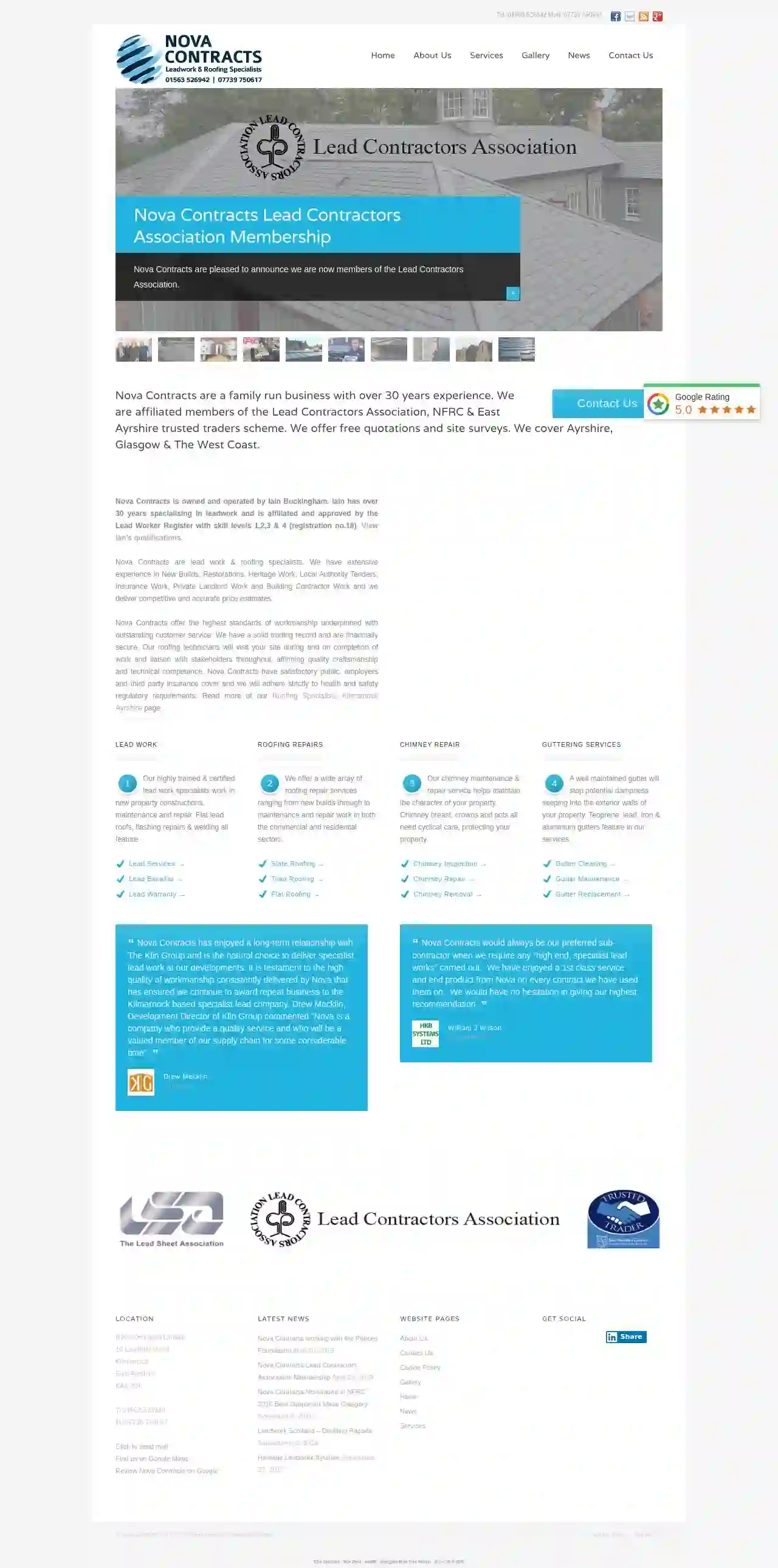
Nova Contracts Ltd
542 reviews10 Leadhills Road, Kilmarnock, KA1 3UF, GBNova Contracts is a family run business with over 30 years experience. We are affiliated members of the Lead Contractors Association, NFRC & East Ayrshire trusted traders scheme. We offer free quotations and site surveys. We cover Ayrshire, Glasgow & The West Coast. Nova Contracts is owned and operated by Iain Buckingham. Iain has over 30 years specialising in leadwork and is affiliated and approved by the Lead Worker Register with skill levels 1,2,3 & 4 (registration no.18). View Ian’s qualifications. Nova Contracts are lead work & roofing specialists. We have extensive experience in New Builds, Restorations, Heritage Work, Local Authority Tenders, Insurance Work, Private Landlord Work and Building Contractor Work and we deliver competitive and accurate price estimates. Nova Contracts offer the highest standards of workmanship underpinned with outstanding customer service. We have a solid trading record and are financially secure. Our roofing technicians will visit your site during and on completion of work and liaison with stakeholders throughout, affirming quality craftsmanship and technical competence. Nova Contracts have satisfactory public, employers and third party insurance cover and we will adhere strictly to health and safety regulatory requirements.
- Services
- Why Us?
- Accreditations
- Our Team
- Testimonials
- Gallery
Get Quote
Over 12,314+ Roofers on our platform
Our roofing pros operate in Stevenston & beyond!
Roofyng.co.uk has curated and vetted Top Roofing Contractors in Stevenston. Find a top & trustworthy pro today.
Frequently Asked Questions About Roofing Companies
- Choose Reflective Roofing Materials: Opt for light-colored shingles or metal roofing that reflects sunlight and reduces heat absorption.
- Install Proper Attic Insulation: Adequate insulation prevents heat loss in the winter and heat gain in the summer.
- Ensure Adequate Ventilation: Proper attic ventilation allows hot air to escape, reducing cooling costs and extending the lifespan of your roof.
- Consider a Radiant Barrier: In hot climates, a radiant barrier installed in the attic can reflect heat away from the roof, further reducing cooling needs.
- Sagging or Pulling Away: Gutters that are sagging, pulling away from the house, or visibly damaged need repairs or replacement.
- Overflowing Water: If water overflows during rain, it indicates clogs or inadequate drainage.
- Visible Debris: Leaves, twigs, and other debris accumulated in the gutters obstruct water flow.
- Water Damage: Water stains or damage to siding or foundation near the gutters suggest overflow.
- Plant Growth: Plants or moss growing in the gutters indicate standing water and the need for cleaning.
- Roof size and complexity
- Roofing material chosen
- Local labor costs
- Accessibility of the roof
- Removal of existing roofing
- Additional features (skylights, chimneys, etc.)
- Asphalt Shingles: 20-30 years
- Metal Roofing: 40-70 years
- Tile Roofing: 50-100 years or more (clay and slate)
- Flat Roofing: 15-30 years (depending on material)
- Slate: 100 years or more
- Wood Shakes or Shingles: 30-50 years (with proper maintenance)
How can I make my new roof more energy-efficient?
How can I tell if my gutters need to be cleaned or repaired?
How much does a new roof cost in the UK?
How long does a roof typically last?
How can I make my new roof more energy-efficient?
- Choose Reflective Roofing Materials: Opt for light-colored shingles or metal roofing that reflects sunlight and reduces heat absorption.
- Install Proper Attic Insulation: Adequate insulation prevents heat loss in the winter and heat gain in the summer.
- Ensure Adequate Ventilation: Proper attic ventilation allows hot air to escape, reducing cooling costs and extending the lifespan of your roof.
- Consider a Radiant Barrier: In hot climates, a radiant barrier installed in the attic can reflect heat away from the roof, further reducing cooling needs.
How can I tell if my gutters need to be cleaned or repaired?
- Sagging or Pulling Away: Gutters that are sagging, pulling away from the house, or visibly damaged need repairs or replacement.
- Overflowing Water: If water overflows during rain, it indicates clogs or inadequate drainage.
- Visible Debris: Leaves, twigs, and other debris accumulated in the gutters obstruct water flow.
- Water Damage: Water stains or damage to siding or foundation near the gutters suggest overflow.
- Plant Growth: Plants or moss growing in the gutters indicate standing water and the need for cleaning.
How much does a new roof cost in the UK?
- Roof size and complexity
- Roofing material chosen
- Local labor costs
- Accessibility of the roof
- Removal of existing roofing
- Additional features (skylights, chimneys, etc.)
How long does a roof typically last?
- Asphalt Shingles: 20-30 years
- Metal Roofing: 40-70 years
- Tile Roofing: 50-100 years or more (clay and slate)
- Flat Roofing: 15-30 years (depending on material)
- Slate: 100 years or more
- Wood Shakes or Shingles: 30-50 years (with proper maintenance)